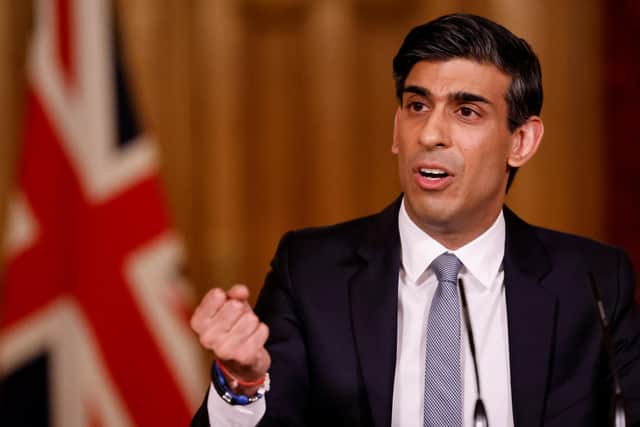Budget 2021: The tricks for Scotland in Rishi Sunak's bag - Erikka Askeland
On the eve of the Chancellor of the Exchequer’s big show, surely the biggest, most expensive attraction to unveil was confirmation there would be an extension of the furlough scheme, which has been the most popular and widely adopted government lifeline since we first heard the dreaded word, “pandemic”.
With this £10 billion budget line out of the bag before the Budget was unveiled, what would Sunak have to hold back that would dazzle, amaze or instruct?


Advertisement
Hide AdAdvertisement
Hide AdExciting for some businesses, at least, if not the average person on the street, there were tax deductions. However, this was not just your run-of-the-mill tax wheeze, but “super deductions”.
This is a two-year window whereby the amount a business spends on new equipment can be used to reduce taxable profits by 130 per cent of the cost.
The Treasury estimates this will be worth £25bn to companies that claim it, which represents a vast amount of plant and machinery. It’s especially vast for an economy where so many workers have been reliant on relatively inexpensive kit, such as a laptop and perhaps one of those portable LED-lamps for banishing chins-on-video calls.
Nevertheless, like those people who have been lucky enough to have accumulated significant savings during the lockdown whilst not hitting the pub or splashing out on expensive holidays, there are companies with cash to spend and the Chancellor is hoping this will encourage them to do so.


The question is, will it make up for the expected £30bn net tax hit the Treasury expects to raise from the rise on corporation taxes?
There is a weary air of inevitability that with the unprecedented stimulus the UK has spent battling the damage caused by the coronavirus, the piper must be paid.
This budget adds a further £44.3bn of support to ameliorate the impact across households, businesses and public services, bringing total cost of pandemic mitigations to a grand total of £344bn.
That he managed to keep to Boris Johnson’s promises not to raise VAT, National Insurance or income tax eased fears of many – albeit the freezes to the income tax personal allowance and higher rate threshold for four years will bring 1.3 million people into the tax system and create one million higher rate taxpayers by 2025/26.
Advertisement
Hide AdAdvertisement
Hide AdHis largess also includes the extension of VAT reductions for the tourism and hospitality sectors and a full business rates holiday to the end of June for businesses in England, with discounts easing to the end of the year.
Interestingly, Scottish companies may be set to enjoy more benefit from the Scottish Government in terms of business rates relative to their neighbours.
Finance secretary Kate Forbes pushed the button earlier this year on a year-long extension of rates relief, before she knew what Sunak had planned, but after the UK Government found an extra £1bn from somewhere deep in the cushions of the Barnett consequentials couch to allow her to fund it.
The estimated £700 million cost of rates relief for the rest of the year in Scotland took up the bulk of this. Scotland now has a further £1.2bn to spend on hopefully equivalent programmes Sunak announced yesterday.
The Chancellor also at last unveiled freeports, announcing eight of them – all in England. He further signalled there will be at least one in each of the other nations.
Freeports have been a pet project for the Chancellor since he was a young MP in 2016, arguing in a paper for the Centre for Policy Studies they were a panacea for regeneration and post-Brexit trade.
Not everyone agrees, as previous attempts have often provided evidence the tax cuts and incentives they offer merely displaces investment from other areas, which can ill afford the losses of occupiers and trade.
In Scotland, Forth Ports is pursuing two bids, one at its operations at Grangemouth and the other in Dundee.
Advertisement
Hide AdAdvertisement
Hide AdHowever, this is currently awaiting the Scottish Government issuing a prospectus looking at their own version – green ports, which are expected will offer the same package of tax and customs reliefs as Sunak’s freeports while also to adopting extra criteria on “fair work” and net zero ambitions.
Forth Ports’ chief executive Charles Hammond is bullish that one or both bids will succeed.
Forth Ports’ Tilbury was part of a successful freeport bid for Thames along with Ford’s Dagenham plant and DP World, owner of the port and logistics park at London Gateway, which he says stands them in good stead.
Accelerated funding for the Falkirk Growth Deals, one of three which Sunak promised will get money in ten years rather than 15, would make a sensible, joined-up approach here.
In Aberdeen, the Chancellor offered a different kind of support for the new £350m harbour being built to the south of its existing, historic port.
This was the announcement of £27m for a new industrial site to be built nearby. The Aberdeen energy transition zone will be aimed at supporting green energy projects such as hydrogen and offshore wind as well as decommissioning of oil rigs and wells.
The package of funding for the north-east of Scotland, which has been hit not just by the virus but also the resulting collapse in oil prices, was another coup for Sir Ian Wood, who led the proposals for the energy transition zone.
It was the former oil and gas services tycoon who also won significant government investment in 2016 for the OGTC, formerly known as the Oil and Gas Technology Centre before it rebranded to its acronym so that it fits better with the new green energy agenda.
Advertisement
Hide AdAdvertisement
Hide AdIn this Budget, the Chancellor also added £5m for the Global Underwater Hub, another project supported a number of agencies including by Sir Ian’s Opportunity North East (One), a private/public sector economic development agency.
There was a further £2m sop for the trade body Oil & Gas UK, who, it is thought, wants rather more than this to underpin the investment oil and gas companies need to make to make the North Sea “net zero”.
There have been many warm words and supportive noises made by a series of UK energy ministers about prospects for a “North Sea Transition deal”. However, the day it becomes electorally acceptable to bung cash at the oil and gas industry seems further still.
Comments
Want to join the conversation? Please or to comment on this article.